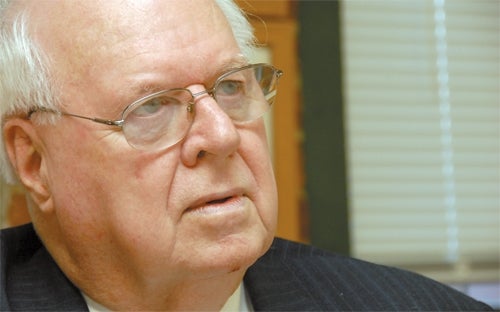Quick—think of an industry that holds up a huge piece of the state’s economy, innovates constantly and offers rewarding jobs.
If you didn’t think of manufacturing, Jack Healy, director of operations at the Massachusetts Manufacturing Extension Partnership, hopes you’ll think again.
If you did, it may be because of Healy’s work over the past decade to boost both the image and the reality of an industry that’s sometimes thought of as a dinosaur.
Two Hats
Working from his offices in an old wire factory in Worcester, Healy leads two separate organizations.
The Massachusetts Manufacturing Extension Partnership helps companies become more efficient and effective, and encourages the training of new production workers.
The Manufacturing Advancement Center studies and publicizes the importance of the manufacturing sector.
To others in the Central Massachusetts manufacturing world, Healy’s energy and commitment to the industry are a huge asset.
“He has the ability to bring all [his] experience to bear and to bring the people who know the different skills that are necessary to make it all work,” said Al Cotton, director of corporate communications at the Clinton-based Nypro plastics company. “I have a great admiration and respect for him personally and for the organization that he’s built.”
Healy is at his most animated when he talks about the role manufacturing plays in Massachusetts and New England. Ask him about himself, and he’ll quickly change the subject to the 922,000 jobs, direct and indirect, and $182 billion in economic input that the industry contributes to Massachusetts.
“I need to have that story told, of what manufacturing is to our state,” he said.
Healy spent the first 15 years of his career at the Beech Nut-Life Savers company, where his work included boosting sales at Worcester’s Table Top pie brand from $16.5 million to $35 million.
“At 59 cents a pie, that’s a lot of pies,” he said.
Innovate Or Die
When Healy left Beech Nut in 1973, he remembers, an executive there gave him a fateful piece of advice: “You can understand how a company really works when you understand manufacturing.”
Healy, this year’s Nonprofits Business Leader of the Year, took that idea seriously, and soon he was working for Lego, giving the Danish company a foothold in the United States, where it was then so unknown that people pronounced it “Lee-go.”
In the early 1980s, Healy became president of Presmet, a homegrown Worcester company that made auto parts for Detroit. He recalls the company at that time as a highly innovative, quality-focused organization that employed experienced people.
To Healy, what happened to Presmet in later years serves as a warning for other manufacturers. In 2002, after Healy had moved on, the company was bought by a large international company, GKN.
“You would think being bought by the largest powder mill company that your future would be assured,” Healy said.
But, in fact, the opposite was the case. As the automotive industry declined, GKN kept producing the same products at the Worcester site, and in 2002 it closed the location.
Had the company remained independent, Healy maintains, it might have diversified its production lines in the early 2000s and remained strong.
For the last 10 years, as head of MassMEP, Healy has helped other companies to take the path Presmet didn’t. The organization’s project managers visit manufacturers around the New England region and guide them toward rethinking everything, making their processes more efficient and more relevant to their customers.
In one recent case, a Maine company that makes breaded cheese sticks hired MassMEP to help it reduce its energy usage.
As they audited the company’s process, MassMEP staff discovered that it kept the cheese in a refrigerator for 10 days before processing it so it would gain a stringy consistency. They quickly suggested an alternative: flash freeze the cheese to get the same result.
Healy said the solution was an obvious one. The challenge was identifying the problem.
“Nobody was looking to reduce the refrigeration,” he said.
Get Smart
Much of the work MassMEP does with client companies falls under the term “lean.” But that can give people the wrong impression.
Kathie Mahoney, who works for the organization lining up assignments with companies, said some clients are worried about what advice MassMEP will offer after other “lean” consultants advised them to cut employees.
“Our philosophy is, no, you retain the staff,” she said.
Healy said employers need to include workers from all levels in figuring out ways to become more efficient.
Once that goal is achieved, he said, they can find ways to move the workers who are no longer needed in one area to another. One good example, he said, is FLEXcon, a Spencer manufacturer that has implemented lean techniques without cutting jobs because it sees more to workers than a set of hands.
“There’s a brain attached, and they don’t want to let those brains go,” he said.
Brain Power
In general, Healy said, he wants to push employers, and society as a whole, to focus more on the brains of production workers. Expecting entry-level employees to take $8-an-hour jobs with no training and act like “boy scouts and girl scouts” with loyalty to their employer is a recipe for failure, he said.
With the hammering manufacturing has taken over the past two years, there’s no shortage of examples of failure in the industry.
But today, as companies that are just starting to recover look for ways to rebuild smarter, Healy and his organizations are ready to make sure they find them.
“We help to take people back to basics,” he said.

